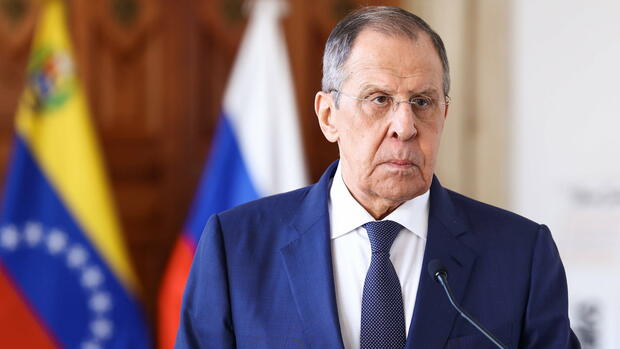Russia’s top diplomat is threatening more openly than ever not to extend the grain deal.
(Photo: IMAGO/ITAR-TASS)
Geneva This Tuesday, the cargo ship “Ikaria Angel” left the Ukrainian port of Odessa for Tunisia. The ship had loaded more than 37,000 tons of grain. The “Ikaria Angel” is one of the hundreds of ships that have left Ukraine since July 2022 with agricultural goods for the world market and exported them all over the world. They all set sail according to the specifications of the Black Sea Grain Initiative.
UN Secretary-General António Guterres calls the agreement on safe exports a “ray of hope”. In fact, a comparable agreement involving two wartime opponents is almost unique in history.
But Russia is threatening more than ever to withdraw from the deal. “We will consider whether the deal is necessary,” Moscow’s Foreign Minister Sergei Lavrov said.
The agreement is nominally valid until mid-May. With effect from March 18, the Russians had again agreed to an extension by 60 days. Before that, the period was twice 120 days. Moscow, it seems, is once again using hunger as a weapon.
“An end to the Black Sea Grains Initiative would be a serious blow to world trade,” Ralph Ossa, chief economist at the World Trade Organization, told Handelsblatt. “The initiative is essential for food security, especially in poor countries.” The consequences are obvious: the loss of delivery of millions of tons of food per month could drive up food prices sharply.
Grain deal has great political importance
The political importance of the initiative can hardly be overestimated. In the hateful atmosphere of Russia’s war of aggression against the neighboring country, the agreement represents an attempt at a confidence-building measure. The package is one of the few agreements that the conflicting parties agreed to.
In fact, the Black Sea Grains Initiative has so far enabled the shipment of more than 28 million tons of grain and other agricultural commodities from Ukraine. By mid-March 2023, 55 percent of exports went to developing countries.
The grain agreement has so far secured the export of Ukrainian grain across the Black Sea.
(Photo: Reuters)
Ukraine and Russia were among the world’s top agricultural exporters before the start of the full-scale Moscow war of aggression on February 24, 2022. Ukraine alone shipped around 45 million tons of grain to other countries every year.
After the Russian invasion of the neighboring country, Kremlin forces blocked Ukrainian agricultural exports across the Black Sea. People around the world felt the effects of price increases and the loss of supplies from Ukraine. But “the Black Sea Grains Initiative helped ease further market concerns and lower grain prices,” according to the sober language of the Food and Agriculture Organization (FAO).
In July 2022, Ukraine, Russia and Turkey agreed in Istanbul on the grain deal for further exports. This was preceded by a tough struggle marked by distrust mediated by the UN. The initiative aims to ensure the safe export of Ukrainian grain, fertilizer and other food from Odessa and two other ports – despite the Russian attack.
The parties gave guarantees of protection for the ships and agreed on inspections aimed at preventing arms smuggling. A second agreement was reached in Istanbul between the United Nations and Moscow. The UN agreed to work for the unhindered export of Russian food and fertilizers to world markets. With the memorandum, the UN wanted to make the Russians agree to the grain initiative palatable.
Russia criticizes export barriers for fertilizer and food
But the Russians see a considerable need for action when it comes to implementing the memorandum. Lavrov demands in particular from the USA, the EU and Great Britain that export barriers for Russian goods be abolished. “If they don’t want to deal with this matter honestly, they can transport the relevant products out of Ukraine on highways and rivers,” the Russian foreign ministry chief sneered.
Lavrov and his diplomats complain that the Russians and their foreign trade companies are faced with insurance hurdles as a result of the Western sanctions policy, that they are cut off from payment transactions or that seaports do not allow their ships to enter. Specifically, Moscow is demanding that the Russian Agricultural Bank be reconnected to the Swift payment system. If the West does not meet the demands, Moscow will in return let the grain deal burst.
The EU does not want to accept Moscow’s arguments. European sanctions do not ban the import, export, purchase or trade of food and fertilizer from Russia, a position paper said. And further: “Russia bears full responsibility for this situation. If there were no war, there would be no trade problems.”
More: The Black Sea becomes the scene of geopolitical power struggles
